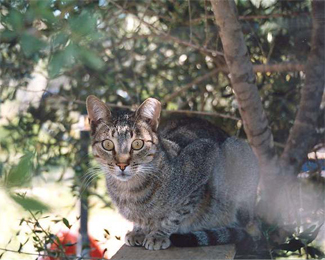Hepatozoon sp. detected in a feline colony in Barcelona

A research carried out by the Department of Animal Health and Anatomy at UAB's Faculty of Veterinary Medicine with the support of the Public Health Service of the Provincial Council of Barcelona has detected the presence of Hepatozoon sp in stray cat colonies. The presence of this parasite is relevant not only because it is the first time these intracellular parasites are found in felines in the north of Spain, but also because it points to the importance of establishing health programmes that detect and control diseases which can affect both other animals and humans. At present the transmission mechanism of this haemoparasite is still unknown, although researchers have been able to determine that it is not as virulent as the haemoparasite infecting dogs.
Stray cats usually constitute feline colonies that could be huge especially in urban areas. In that cases, the application of animal health programmes are necessary in order to detect diseases that could be important not only for animals but for public health too.
Within the framework of a local animal health programme in feline colonies in collaboration with Servei de Salut Pública de la Diputació de Barcelona (Barcelona County Council), Hepatozoon sp was detected. Hepatozoon is an apicomplexan parasite that infects a wide variety of hosts. The infection is well recognized in dogs but not in cats and it is caused by Hepatozoon canis in Europe. Dogs can be infected by being fed a brown dog tick Rhipicephalus sanguineus that has previously been given a blood meal on a infected dog.
This is the first time that Hepatozoon has been identified in cats from northern Spain. But the isolate Hepatozoon sp. differs from H. canis genetically and in terms of virulence. Hepatozoon sp. was identified in cats using molecular biology techniques; the parasite was not observed when standard parasitological procedures were appplied. None of the positive cats showed clinical disease. In that sense, Hepatozoon shows low virulence in cats. No statistical differences were observed when comparing Hepatozoon infection with Feline Leukemia and Feline Immunodeficience infection status, both common diseases in cats. The transmission remains unclear at present. It has been hypothesised that Hepatozoon sp. of carnivores are all likely to be transmitted by ticks, but other potential vectors, such as fleas, must be taken into account. Additional studies are underway to clarify the transmission of this hemoparasite in order to understand this infection.


